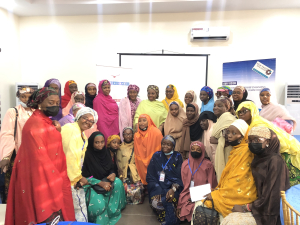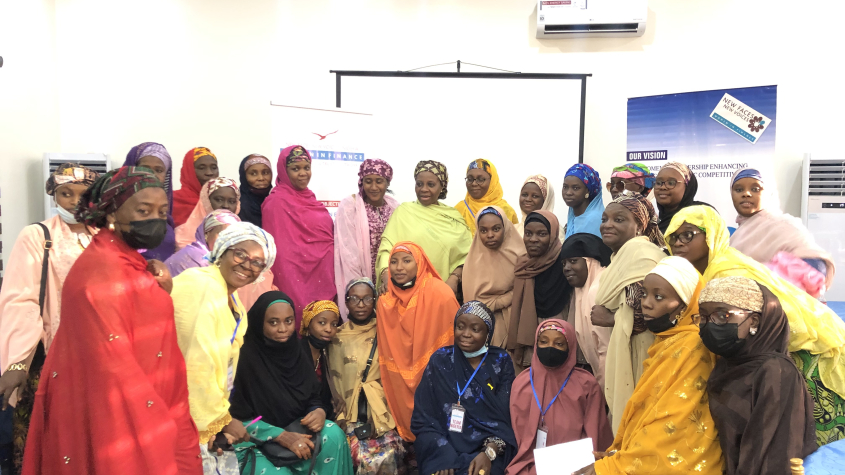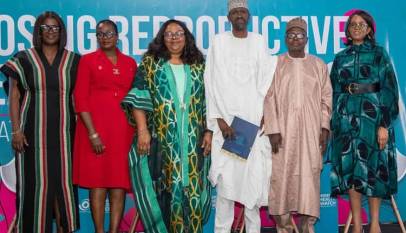NWEES 2.0: Empowering Northern women entrepreneurs to access funding opportunities
The Nigeria chapter of New Faces New Voices (NFNV Nigeria), with the support of the United Parcel Service (UPS), recently hosted the second edition of its Northern Women Economic Empowerment Summit (NWEES) in Kano, themed: “Empowering women entrepreneurs: A panacea for poverty reduction and job creation in North-West Nigeria.” (Practical appraisal)

The maiden edition of the NWEE Summit took place in December 2021 focused on addressing the high rate of unemployment and rising poverty among women in Northern Nigeria, against the backdrop of the Covid-19 pandemic and the arising restrictions on business activities. Thus, NWEES 2.0 focused specifically on building the capacity of participants on approaches to scaling their businesses by taking full advantage of funding opportunities from the federal government, financial institutions and development partners.
Ms Aishatu Debola Aminu, NFNV Nigeria Country Director, while welcoming participants to the Summit said NWEES had become a hub for synthesizing both theoretical and practical opportunities and challenges of Northern women entrepreneurs, adding that double-digit inflation, the post covid-19 economy and looming global recession necessitated the organizing of the second edition of the Summit.
Ms Aminu said, according to the National Bureau of Statistics (NBS), unemployment was at 33.3% while 63% of people living in Nigeria were multidimensionally poor, with North-Western states having the highest number of poor people in Nigeria. Against this backdrop, she said the theme of the Summit was pragmatic and aimed at providing practical assessment and strategies to navigate the economic quagmire.
“Women entrepreneurs, especially in the North-west, have the potential of reversing this gloomy situation to an oasis of productivity and profitability. The summit provides tailor-made business knowledge, strategy, networks and support for women entrepreneurs. Among others, the outcome of this summit is women-owned SMEs being positively impacted and transformed. Thus, the practical appraisal is deliberate to enable us graduate from what we did in the last summit and move women out of poverty with dignity.”
Alhaji Shehu Muhammed, Sarkin Shanu of Kano and NFNV-Nigeria patron, in his goodwill message encouraged Northern women to harness opportunities in SMEs rather than depend on white collar jobs, reassuring them of immense opportunities across the agricultural value chain which he said were critical to wealth creation and uplifting women out of poverty.
The NFNV Nigeria patron said over the years Northern women’s economic progress was hampered by archaic cultural beliefs, inability to access quality education and limited knowledge of financial literacy, as well as financing opportunities for their businesses, which pose a serious threat to women’s capacity for wealth creation.
“Irrespective of the looming challenges, I urge all the summit participants to make good use of the knowledge acquired in this summit which will enhance their access to finance and foster poverty reduction among Northern women. My expectation after this summit is to see more women thriving in the area of wealth creation, not only in Kano state but within Northern Nigeria,” he said.
In his keynote, Prof. Murtala Sagagi, a professor of business administration at Bayero University Kano (BUK), decried the fact that successive governments in Nigeria had consistently failed to diversify the country’s economy, which has remained dependent on oil and importation of most of its processed and industrial products, even as the country grapples with various forms of social and economic crises, with women being adversely affected by the fallout of the crises and failure to diversify the economy.
Prof Sagagi said while Nigeria’s economy has not grown to a level that it could cater for the employment needs of its citizens, including women, archaic socio-cultural practices and beliefs as well as the lack of access to education has limited women’s ability to identify and harness opportunities for poverty reduction as well as upscaling of their businesses.
“Many young women face social pressures to leave school early, marry, and begin a family, stifling their economic participation. Street hawking and gender-based violence exert pressure on girls and women. These restrictive social norms and lack of economic independence limit women’s opportunity to assume decision-making roles in their households, businesses, and communities, thereby suffocating the potential of women entrepreneurs in Northern Nigeria.
“A multi-stakeholder approach is needed to ensure rapid capacity development of women, especially entrepreneurs, and create an enabling environment for women to fully actualize their dreams as mothers and key social and economic drivers. Accordingly, it is estimated that Nigeria’s gross domestic product (GDP) could grow by 23 percent ($229bn) by 2025 if women’s participation in the economy is the same extent as men’s,” Prof. Sagagi explained.
While sensitizing participants on the role of financial literacy in improving business sustainability, Mr Olawole Fasanya, director-general of the Small and Medium Enterprises Development Agency of Nigeria (SMEDAN), [represented] said many business ideas have remained mere thoughts due to lack of funding, while many good businesses have been choked out of existence due to lack of adequate capital to sustain them hence the necessity to borrow.
To this end, Mr Fasanya stressed the importance of understanding the risks associated with financing business with borrowed funds, stressing that “If you must get a loan, then take time to understand the economic reason for borrowing, the loan agreement and also ensure that the interest rate is well negotiated. Also, paying close attention to every detail while analyzing loan agreements, and seeking the counsel of lawyers in the process will aid better understanding of any agreement.
“As an entrepreneur seeking loans from financial institutions, it is important to have a fruitful banking relationship. Financial institutions are concerned about how realistic any business concept is i.e low risk of the business crashing, opportunity for financial returns as well as strong operational control amongst others, before approving loans for SMEs,” he cautioned the women entrepreneurs,” the SMEDAN DG urged the participants.
Mr Fasanya noted that aside from personal savings and debt financing, women could access funding from government agencies such as the Central Bank of Nigeria’s MSME Development Fund, Bank of Industry (BoI) and Bank of Agriculture (BoA), specialized programs like You-Win, Industrial Training Fund (ITF) as well as from venture capital firms and international donors through non-governmental organizations (NGOs).
Ms Mariam Umar, an official of the National Agency for Food and Drugs Control (NAFDAC), while encouraging women entrepreneurs to add value to their products, emphasized the need for women entrepreneurs to have their goods registered and certified by NAFDAC, for which they must meet the minimum current Good Manufacturing Practice (cGMP), among other documentation requirements.
Ms Umar said lack of proper orientation and knowledge on the process of obtaining certification remains the biggest challenge faced by women entrepreneurs, adding that to address this challenge, NAFDAC’s program for MSMEs registration had identified most of the challenges faced by MSMEs and was offering an alternative and easier route for addressing most of them.
“For goods to be certified by NAFDAC, they have to be documented and the requirements are a business name, trade mark registration, among others. Following that, there will be a facility inspection by NAFDAC to ensure the environment is fit for business, after which there will be product sampling and lab analysis of the goods to determine the safety and quality of such products to the populace. Products that successfully pass this stage are then considered for certification and given registration numbers,” she said.
Ms Hajara Bala, one of the Summit participants described the experience as creating a pathway for prosperity among women-owned SMEs. “As a civil servant, I believe that one day I will retire, therefore the knowledge I have gained in this workshop and the many business ideas I learnt will help me when I eventually retire from service of the federal government,” she said.
Rabi Mohammed, another NWEES participant, said the workshop could not have come at a better time than now, considering the present state of the Nigerian economy. “Honestly, I am glad I attended because people pay to acquire the type of knowledge I got in this workshop for free and I can only but express my gratitude to the organizers.”
As part of the NWEES 2.0 activities, UPS hosted an entrepreneurship competition among the Summit participants. The winners of the competition were Salma Idris of Salma Foods and Oil, Barr. Sa’adatu Illo of S&M Golden Ventures Limited as well as Saddiqa Tijjani, who produces veils and local confectionaries.















